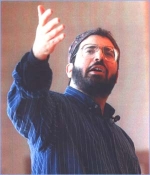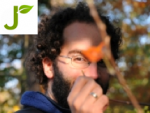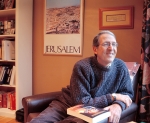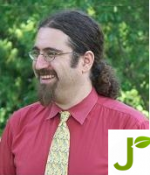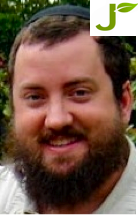Eco-Theology Subscribe
A selection of initiatives, blogs, resources and communities on Jewcology which focus on eco-theology.
Blogs
Tu B’Shevat Seeds
Dear friends, The origins of this post began over a year ago when I came across a quote that looked to me like Rabbi Heschel challenging Martin Buber’s masterpiece, I and Thou. Unbelievable, right? Like two superheroes fighting. I was compelled to explore deeper. Here’s what Rabbi Heschel said: “…I am not ready to accept the ancient concept of prayer as dialogue. Who are we to enter a dialogue with God?” He then declares that he is only an “it” immersed within the all that is God and can not be an ‘I’. ...
What does it mean to be a “Sustainable Jew” (CJN Sept 2010)
This column was originally published in the Canadian Jewish News - September 22, 2010 Have you ever thought of Sukkot as a holiday which celebrates the Sustainable Jew In ancient Israel, Sukkot had a major agricultural focus. The celebration was a thanksgiving for the fruit harvest and the blessings of nature in the year that had passed. Today, Sukkot is a Jewish Festival where we step out of the comfort of our own homes, and enter temporary dwellings where we are exposed to the vagaries of the weather while performing the mitzvah of “Leshev Bsukah&rdqu...
Pre-Tu b’Shvat Brunch Lecture: Lessons from the olive tree for families, Jewish unity, and the Social Security system
On Sunday, Jan. 22, 2012, I will be presenting a brunch lecture at the YM-YWHA of Union County, NJ, from Noon to 1 PM on "Lessons from the olive tree for families, Jewish unity, and the Social Security system." Highlights include: The Chanukah story they DIDN’T tell you as a child Why a nineteenth-century rabbi used botany to make sense of Kabbalat Shabbat The hidden tree and advice to adult children and parents in Psalms 92 and 128 The fee for the program is $3 for YM-YWHA and JOY members and $8 for all others. For more ...
The Voices of the Whales and the Trees: Lessons for TU B’SHEVAT
It was not a typical Shabbat afternoon that August of 2001. We were sitting on the shore of Windfall Island, on the edge of Tebenkof Bay in Southwest Alaska, watching the Humpback whales feed in Chatham Strait. As we watched, they moved across our view from north to south, diving and surfacing as they fed. They moved behind a small island and as they came back into view two whales suddenly threw themselves into the air at the same time. Then others followed as we shouted in delight. It was a fitting climax to a wonderful and inspiring experience. The “we” ...
Seeds
(reposted from Rabbi Nina Beth Cardin's blog: http://blog.bjen.org/ dated January 6, 2012) In Genesis 1, on the sixth day, God creates man and woman after having created all the rest of Planet Earth. In a gracious effort to provide some guidance, some instruction to these bewildered, befuddled neophytes on how this novelty of life could possibly work, God says, "Look around. All this grandeur is there for you." 28 God blessed them and said to them, “Be fruitful and increase; fill the earth and subdue it. Rule over the fish in the sea and ...
Jewish Urban Farming Internship
Urban Adamah, based in Berkeley, CA, is a three-month intensive residential leadership training program for young adults ages 20-29, that integrates urban organic farming, social justice work and progressive Jewish living and learning. Twelve Urban Adamah Fellows are selected each season to operate an organic farm and educational center, intern with community organizations addressing issues at the intersection of poverty, food security and environmental stewardship, and learn an approach to Jewish tradition that opens the heart and builds joyful community. Applicants do ...
Jewish Environmentalism or Jewish Ecology?
As a member of the self described ‘Jewish environmental movement’, I find it necessary from time to time to ask myself what it means to be a Jewish environmentalist. Having covered that in my last blog post, I want to ask a follow up question. As Jewish environmentalists, are we operating ecologically? Do our organizations, institutions, and members observe, interact with, and learn from the multivalent relational systems present in the world? If we examine the biblical narrative of Abraham, it is clear that a careful, considered questioning of relatio...
Cisterns or Trees…?
(reposted from a blog by Rabbi Nina Beth Cardin, http://blog.bjen.org/) There is a wonderful teaching in the Jerusalem Talmud which reads: "Rabbi Yohanan, speaking on behalf of Rabbi Yossi, says: 'Just as they (the other rabbis) believe that civilization depends on cisterns, so I believe that civilization depends on trees.'" The work of blending civilization and nature has always been a challenge. In this "man vs nature" tug of war, we must ask, who wins? What has precedence over what; what should yield to what? Gray infrastru...
The Festival of Lights: The Spiritual Dimension of Energy
Oh, Lord, my God, You are very great; You are clothed in glory and majesty, Wrapped in a robe of light; You spread the heavens like a tent cloth. (Psalm 104:2) Hanukkah which means “(re)dedication” has also been called the “Festival of Lights” at least since the 1st Century CE as the earliest reference to this name is found in the historian Josephus: And from that time [the purification of the Temple by the Maccabees] to the present time we celebrate this festival, and call it Lights. I suppose the reason was, ...
The Everyday Greening of Teshuvah
Dear Friends, I’d like to open a kettle of worms. To reveal the concealed. Though quite honestly, I’m feeling a little guilty about sharing it. I’d like to dig into the anguish and sometimes near crushing feelings that writing about tremendous mountains of electronic waste stir up (see my past blog here). Living in America in the new millennium, I’m aware that even the most “virtuous” of green paths cannot escape deep impacts and repercussions. After all, the problems are so large, and my everyday life is intimately ...
“Simple Actions for Jews to Help Green the Planet”
WHAT IS THE RESPONSIBILITY OF JEWS TO SAVE OUR PLANET? Thousands of years ago our ancestors lived with a keen awareness of their dependence on the natural systems that support life. Through their daily interactions with soil, water, and air, they developed a great respect for the Earth and sensed the presence of the Divine within all of Creation. Although many Jews today have lost this connection, our ancient relationship with nature is nevertheless reflected in Jewish law, in our prayers, in the celebration of our holidays, and in the core values of our tradition...
Radical Judaism Book Review
Shalom, I’d like to dedicate my first Jewcology blog to Rabbi Arthur Green and his latest book, Radical Judaism. I believe this an extremely valuable and important book as we head into the next centuries of Jewish life. What do you think? What books would you recommend? I look forward to the conversation. David Arfa, Maggid (Mah-geed; Storyteller)/ Environmental Educator Radical Judaism is written for all of us who are exploring fresh relationships between mind, forest, earth, cosmos and religious life. It is not a how-to ...
Hamakom (The Place), Public Space, Property, and Ownership
How might we better understand climate change, social inequality, and the sense of personal isolation that pervade much of modern society? In a metaphoric and material sense I believe the answer lies in societal conceptions of public space, property, and ownership. These elements are hallmarks of industrial society and in many ways define the boundaries and context of personal, corporate, and governmental relationships – temporally as well as spatially. The parceling out of land (the Dawes Act in the US, the Inclosure Acts in England, and many more) for ...
Question of the Week #17
Rabbi Nathan Martin, Director of Student Life at the Reconstructionist Rabbinical College, and Jason Bonder, student representative on the RRC Green Committee (and chair of the Recon Riders Team for the Hazon New York Ride), ask the Jewcology Question of the Week.
Top 5 ‘Religious’ Excuses for Not Believing in Climate Change Rebuked
A response to growing frustration with the ‘religious’ right and the naïve. Excuse #1: God told Noah that God would not destroy the world again, so it can’t happen. Response: There is a classic story about a man who hears on the radio that a flood is coming and will destroy his home. His response, “Nothing to worry about, G-d will save me.” A man comes door to door telling everyone to evacuate, “G-d will save me.” The flood levels rise and so people come by boat and helicopter to save the man, “G-d will ...
On Overpopulation
There are a good many issues upon which Environmental and Jewish values seem to be in lock-step, and then there are those challenging issues where our environmental values and our Jewish values seem to come into conflict. Perhaps no issue presents such divergent viewpoints between the Environmental and Jewish perspective as that of “overpopulation”. As our planet is set to cross the 7 Billion human threshold this year, and environmental problems continue to grow exponentially worse, there is no better time to address this issue than the present. ...
Our Leaders Today: Interview with Lee Wallach of Faith2Green
Jewcology’s “Our Leaders Today,” is a monthly colum interviewing environmental leaders and activists in Jewish communities near and far. Through personal stories, the columnm, like Jewcology.com, serves not only to generate exposure for important initiatives, but in helping you and I reflect, re-invest, and connect our own efforts, values and goals among our communities. As both a business leader and non-profit professional Lee H. Wallach is active in his community. He is a founding board member and President of the Coalition on the ...
Honey From the Rock: The Torah’s Deep Ecology
Time is running out to avoid disaster. This is the refrain that emerges from even a cursory glance at the media’s portrayal of such pressing issues as global climate change, world peace, and economics. In an ever rapidly changing world, in which it seems we have very little control and very little understanding of how we arrived here, disaster seems all but a foregone conclusion. It is unfortunate that the global narrative that is being woven, for the most part, lacks a comprehensive framework within which to take steps to avoid the doom and gloom scenar...
Getting Back to My Roots
Despair Like so many of the people I know who are deeply concerned with the rapidly multiplying environmental issues confronting our world, I recently became discouraged by the inability of our government to take meaningful action. This feeling slowly morphed into disgust, which turned into anger, which then changed into fear. I kept thinking, if our leaders cannot even address the big environmental issues that are occasionally covered by the media, such as climate change and alternative energy, then we are in real trouble when it comes to the hundreds of other ...
Our Leaders Today – Interview with Rabbi Alyson Solomon (CBB, Santa Babara, CA)
Jewcology’s “Our Leaders Today,” is a monthly colum interviewing environmental leaders and activists in Jewish communities near and far. Through personal stories, the columnm, like Jewcology.com, serves not only to generate exposure for important initiatives, but in helping you and I reflect, re-invest, and connect our own efforts, values and goals among our communities. "Awe Was My First Religion" - Rabbi Alyson Solomon Q: How did you come to see the ...

